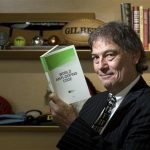By Andy Boynton, with William Bole.
Like many who write about ideas,
I have a weakness for the iconic figure—the legendary innovator who has much to teach us. And so, I’ve written in this space
about such figures as Walt Disney, Thomas Edison, Warren Buffett, Steve Jobs, and others. What
I’ve said less about are the kinds of people I talk to all the time. They aren’t (yet) household names, but they’ve helped me
and many others advance along the trail of ideas.
One of them is my fellow Forbes blogger Steve Denning, author of The Leader’s Guide to Radical
Management: Reinventing the Workplace for the 21st Century (Jossey-Bass, 2010). Recently I asked him an open-ended
question: Where do you search for ideas? I mentioned books, journals, blogs, movies, conferences, research studies, friends,
and acquaintances, among other possible sources. And his bracingly open-ended answer was: All of the above, all of the
time.
“Ideas can come from anywhere, sometimes from the oddest places,” he said. “I might be having a conversation
with someone at dinner, or watching a newscast, or reading a poem, listening to my daughter talk. Suddenly I see a connection
to a problem or issue that I have been puzzling about. Bingo! The beginning of a new idea is born.”
The people I talk
to don’t just go looking for an idea when they need one. This past summer, when I asked author and speaker Guy Kawasaki about his “search” for ideas, he made a subtle but
challenging point—“I’m never in a search mode.”
Put another way, Kawasaki doesn’t search sporadically or in a narrowly
goal-oriented way. “I’m always reading stuff across a wide variety of topics in many publications, and sometimes things
strike my fancy,” he explained. “This is very different from saying to myself, ‘Okay, now you’ve got to read something to
advance your goals and objectives by finding great ideas.’”
People like Kawasaki have cultivated a habit of
learning—one that often blurs the lines between professional and personal or intellectual interests.
After mentioning
some of her favorite sources of management ideas, healthcare executive Teddy Frank told me, “I also seek out learning
for personal growth. I think this is the most important part of being an Idea Hunter—to be constantly in a learning state of
mind.” Frank leads efforts in organizational change at Philips Healthcare, a global corporation with
headquarters in both the Netherlands and in Andover, Massachusetts.
At home, for example, she likes to peruse course
catalogs to see what classes might further her learning beyond what’s needed for her work. Or she’ll just get ideas from
those catalogs about topics worth thinking and talking about. “I use this time for personal reflection and growth, and often
get together with likeminded friends to engage in learning that might go beyond the parameters of strictly professional
development,” she related.
At work, her main source of useful, practical ideas is her colleagues. She’ll find out
about an idea that’s working in one part of the organization and immediately begin a conversation around the question, “Where
else might this work?” That’s how change sweeps through an organization.
Among the many different habits of learning
and hunting for ideas, these and other successful idea people often mention two in particular: observing and
recording.
Write it Down, Get it Moving
They would heartily agree with the accidental
philosopher Yogi Berra, who said, “You could observe a lot just by watching.” Matthew E.
May, an internationally recognized expert on change, innovation, and design strategy, told me that part of his daily
regimen is “paying close attention through keen observation to my surroundings, wherever I am and wherever I go. And
recording both elegant solutions and opportunities to solve existing problems with an elegant solution.”
While on a
trip to Sweden, someone told May about how Holland has cut down significantly on car accidents at busy intersections by
simply reducing the clutter of confusing traffic signals and controls. He listened, jotted down the idea, and made a beeline
for Holland. He wound up writing about the experiment in his popular book In Pursuit of Elegance: Why the Best Ideas Have
Something Missing.
May captures his better ideas on what he calls an “IdeaSheet” roughly the size of a personal
journal page. It has four distinct components that he summarized this way: “Come up with a sticky name, a short description,
a brief explanation of why it’s important or valuable, and a drawing. I think the last part is key—the ability to sketch your
concept is the first step in turning the idea into action, because it’s a first draft, a low resolution prototype,” he wrote
in an email to me. “The IdeaSheet is actually a short story once completed, one you can tell.”
By this point, of
course, May isn’t just recording an idea: he’s beginning to test and develop it. Almost every successful idea person I know
stresses the need to do just that—to get ideas moving.
“I try to put them into play as soon as I can by emailing
someone about the idea,” my friend Howard Weinberg, who retired recently as senior partner for Deloitte Consulting, noted. “I
put them into my social knowledge network, which is part of my imperfect storage system.” Likewise, marketing expert Jim
Pulcrano of the IMD in Switzerland told me that he shares ideas immediately “so that I get an echo that tells me whether this
idea has legs.”
I cite these people not because they have rare talents, which I’m sure they have. I cite them because
generally speaking, almost anyone can do what they do. They look for ideas, and they’re constantly at it. They don’t wait for
ideas to pop into their heads. And they don’t fuss over the need for stunningly original notions—they’re happy to borrow and
adapt and repurpose. What they do have, in addition to these essential habits, is a passion for ideas. “For as long as I
could remember, I have been drawn to, consumed by, even obsessed with, ideas,” May said.
Maybe we don’t all have to be
obsessed, but pretty much every professional needs to think about how to find ideas that make a difference. In the
organizational world, everyone needs to be an idea professional.
Boynton is Dean of the Carroll School of Management at Boston College and coauthor, with Bill Fischer, of The Idea Hunter: How to Find the Best Ideas and Make
Them Happen (Jossey-Bass), written with William Bole.



